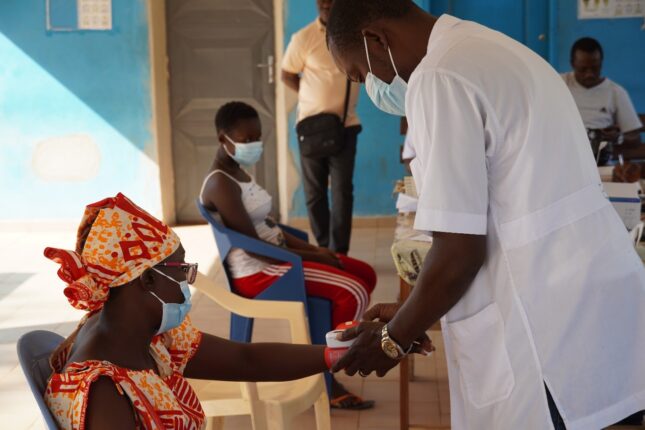-
Lessons from the COVID-19 Pandemic Can Help Achieve Health for All
January 10, 2024 By Deekshita Ramanarayanan
“The [COVID-19] pandemic, as all of you know, severely disrupted essential health services in countries around the world, and it left many health systems reeling from the drain on resources,” said Nidhi Bouri, Assistant Administrator for Global Health at the United States Agency for International Development (USAID) at a recent Wilson Center event to assess lessons learned in coping with the stressors created by the global health crisis.
The event, held in partnership with USAID, MOMENTUM Knowledge Accelerator, and the Local Health System Sustainability Project, examined how one particular tactic — health systems strengthening (HSS) —yielded new insights.
During the pandemic, USAID utilized a HSS approach, which is traditionally deployed outside of an emergency response situation. Yet the agency found that utilizing this approach during an ongoing crisis allowed stakeholders to get beyond a focus on immediate needs. Using HSS allowed them to lay a foundation for health systems resilience and strengthening in preparation for future shocks.
“As we look around the globe, in every region, it is clear that all health systems will continue to face shocks, whether as a result of disease outbreaks, protracted conflict, or climate shocks,” said Bouri.
Improving Provider Capacity Through HSS Investments
MOMENTUM is a global suite of awards funded by USAID that was created to reduce mortality and morbidity among women and children around the world and supported more than 15 partner countries to combat COVID-19 and maintain essential services during the crisis. Implementers of several MOMENTUM projects have sought to understand the extent to which HSS activities were utilized and successful in the response to the pandemic.
Megan Ivankovich, Senior Learning Director at MOMENTUM Knowledge Accelerator shared the findings from three case studies – MOMENTUM Country and Global Leadership in Sierra Leone, MOMENTUM Routine Immunization Transformation and Equity in India, and MOMENTUM Safe Surgery in Family Planning and Obstetrics in India.
Researchers found that an HSS approach helped improve community engagement and ownership of health systems at a local level in both countries. In India, for example, community influencers led engagement to increase demand for the COVID-19 vaccine. In Sierra Leone, efforts to increase infection prevention and control focused on increasing provider capacity through increased training and support.
“However, capacity strengthening requires more than just one-time training,” observed Ivankovich. Supportive supervision promoted mentorship and problem solving between supervisors and supervisees, as well as enabled data collection and learning. “Just having regular access to updated data to understand the needs and challenges enabled the interventions to adapt quickly and to respond to the local context,” added Ivankovich.
In India, the MOMENTUM Safe Surgery in Family Planning and Obstetrics project aimed to target mechanisms to prevent, identify, and respond to gender-based violence (GBV) at the community level amid the COVID-19 pandemic. Its programs worked to build interventions that operated within the framework of existing GBV response in the Indian government, improving ease of data collection and allowing staff to leverage existing relationships in government offices.

Local Innovation Strengthened Routine Service Delivery
Localized responses to the COVID-19 pandemic yielded broader effects on health systems, noted Yordanos Molla, Monitoring, Evaluation, and Learning Lead, Local Health Systems Sustainability (LHSS) Project, Abt Associates. The LHSS team collected “change stories” across multiple domains to explore the ripple effects created by these efforts.
In Peru and Ghana, analysis of change stories found that in response to the COVID-19 pandemic, funding was leveraged to accomplish a number of interventions, including a strengthening of both routine service delivery and local capacity to endure future shocks, as well as improvements in broader health system dynamics. Telemedicine systems were also leveraged to provide chronic disease and mental health counseling.
Regulatory agencies in Ghana also worked to ensure that vaccines could be manufactured locally in a quick and safe turnaround time. Collaborating and engaging with the private sector was also “critical” to address shortages of personal protective equipment in that country.
“It is important to focus on the problems, and see how the problems can be converted into a solution,” said Molla. For instance, the spread of misinformation and disinformation in Ghana offered an opportunity to engage technological sectors to provide cybersecurity trainings to health systems managers. This outreach also improved overall health information system management there, she said.
Digital Health Systems in Emergency Response
Digital technologies and data systems (often referred to as “digital health”) are critical to promoting COVID-19 vaccine service delivery, shared Adele Waugaman, Senior Digital Health Advisor, USAID Bureau for Global Health. Such efforts can be traced back to the Ebola outbreak in West Africa in 2014, when Ministries of Health and development partners sought to understand how the disease outbreak was progressing across communities.
“As health systems have increasingly digitized, we’ve seen the need to think about change management around the use of digital systems,” said Waugaman. Digital health ensures that information can be effectively shared across governments to respond to new outbreaks as they occur.
The onset of the COVID-19 pandemic came just months after the publication of USAID’s Digital Health policy, ensuring that country governments and development partners already were equipped with guidance based on prior emergency responses, added Waugaman. Different digital technologies and data systems were used across multiple phases of response, including detecting and containing the virus through contact tracing and communications tools, monitoring supply chain and logistics management information systems, and even investments into vaccine certificate systems and systems to track adverse effects of the vaccine.
The tensions in the emergency response arose from balancing the need to act quickly with the need to build sustainable digital systems. While funding streams were designed to meet immediate needs associated with the pandemic response, Waugaman noted that countries where there were existing digital systems and capacity were better able to respond to the pandemic.
Lessons for Future Pandemics
A number of key takeaways for future pandemics or system shocks emerged from the discussion. One is that programs must work within existing social structures to address new and emerging threats. “We don’t need to reinvent the wheel,” said Molla.
“It’s important to build on structures and knowledge from previous pandemics,” agreed Ivankovich, who noted that successes in Sierra Leone’s COVID-19 response could be attributed to previous Ebola response efforts.
Reflecting on the COVID-19 pandemic forces us to think beyond the “usual” framework of global health and past siloed and fragmented systems, said Waugaman. A foundational part of that rethink is multisectoral collaboration, added Molla, including collaboration with the private sector for effective and efficient emergency response.
“Strengthening health systems is not just an essential, but a necessary step, with primary health care as the foundation,” said Bouri. “This improves the chances that health systems around the world will be better prepared to respond to the next health emergency ensuring we don’t lose ground in advancing countries’ Universal Health Coverage goals and above all, in advancing health equity.”
Sources: U.S. Agency for International Development.
Photo credit: Person getting vaccinated against COVID-19 getting tested for hypertension. Timothe Chevaux (MSH). Used with permission courtesy of MOMENTUM Knowledge Accelerator.
 A Publication of the Stimson Center.
A Publication of the Stimson Center.







